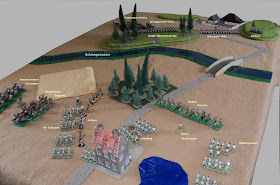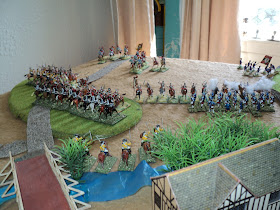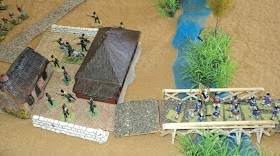His attempt to penetrate the Rechburg cavalry screen having failed, the Imperialist commander Baron Glockenspiel was not unduly disappointed. It had been a 'try-on' - risking a minor defeat in order to gain intelligence of enemy whereabouts, but also to gain some time. The rebuff he had received did nothing to slow down the advance of his Corps. Only one day later he ran into the Rechburger army, drawn up waiting across the Zerbst road.

Count Raunchfester had chosen a fine defensive position. The road north swung slightly eastward to avoid and loop around a bluff beneath which flowed the wide but shallow stream, the Schlangewasser. The Gimmeitor-Oels Infantry Regiment could be seen spanning the gap between the rising ground on either side of the road, but Glockenspiel knew for certain that here was where the Rechburgers had determined to take a stand. He decided that he would cross the river on both sides of central ridge, but also have Alt-Colloredo Infantry scale the bluffs at the same time. The hope was that by so doing the Rechburgers could not concentrate for a blow against an Imperialist wing isolated by the difficult river crossing.

In this Glockenspiel had at least in part divined Raunchfester's intent. The Count was hoping that the difficulty of forcing this position would give the Imperialists pause, and that they would await reinforcements. Who knew when they would arrive? Having discovered thereby the Imperialist strength, he could fall back towards Zerbst and there join up with the rebel army newly victorious (he hoped) over the electoral army to the east.
Whilst setting this game up for a solo game, I was visited by a friend, Brent Burnett-Jones, who ended up pretty much playing the Rechburger side. I had just about decided upon the Rechburg dispositions, when Brent suggested how he would set up. My response was 'Why not? Let's give it a go!' It wasn't too dissimilar to what I had in mind, as it happened.
As the Imperialists closed up upon the stream, the Rechburg artillery tried long shots against the Nadasti Hussars screening the right front of the Imperialist advance, drawing first blood as a file of troopers was bowled over.

The difficulties of the river crossing soon presented themselves. As it swept beneath the bluffs, the river formed an awkward angle, so that Alt-Colloredo Infantry tended to mask the guns intending to protect the crossing. Surging forward from behind the ridge crest, Ewige-Blumenkraft Infantry delivered an effective volley across the river. The grenadier company Alt Colloredo had to fall back to enable the guns to fire. That fire proved sufficiently effective. Eighty men the poorer (4 figures) the Rechburg infantry fell back behind the crest. The Imperialists, however, were loath to follow.
On the right, the regiments of Arenburg and Hildberghausen were finding the river crossing disrupted by the presence of the bridge forming an angle. Both regiments had to drop a company out of the line, and the Rechburg artillery was taking a steady toll upon the Hildberghausen infantry. The latter, however continued to advance under heavy fire, its morale still high.
My rule set tests morale only if 10+% losses are incurred in one turn. The losses to Hildberghausen, though heavy, were rather more gradual, only twice forcing a morale check, both passed comfortably.
On the other flank, the Trautmannsdorf Cuirassiers quickly crossed the stream and awaited the arrival of the Dragoons. During this time, the Imperialists more than half expected an immediate counter-attack by the Rechburg horse, but their intent, it transpired, was to draw the Imperialists further on.
That the intended trap failed was due to the Trautmannsdorf Cuirassiers' headlong charge that broke the spring. To keep off the Uhlans, the Cuirassiers' right hand troop swung off to the right, where they faced nearly treble their numbers. The remaining troopers smashed into their Rechburg counterparts, and exacted within moments a fearful vengeance for their defeat of the Khevenhuller Dragoons the day before. However, in combat against the Uhlans, numbers proved decisive, and scarce a quarter of First Troop survived.
Contrary to the day before, this time numbers did make a difference. The Cuirassiers got one die with a Die Range of 4; the lighter Uhlans, 2 dice with a Die Range of 3. The Cuirassiers rolled a 5 - too high, so no hits. The Uhlans rolled 3,4 the 3 counting 3 hits, the 4, nothing. Three hits resolved into 3 casualties, and a heavy defeat for the lone troop of Heavies.

However, with the Imperialist Dragoons following up rapidly, the Rechburg horse were driven back. The Klutzenputz Cavalry rallied for a second encounter with the Imperialist Cuirassiers, and even got slightly the better of it, but the cost was too great. Reduced to less than half their original numbers, the Rechburg heavy horse fled the field. In the meantime, Raunchfester had ordered Ewige-Blumenkraft Infantry to pull back and drive off the Imperialist horse. Khevenhuller Dragoons came under a galling flanking fire as they pursued the hastily withdrawing Uhlans, but it was clear that the Imperialists on this flank were well established on the Rechburg side of the stream.

The Ewige-Blumenkraft infantry having disappeared behind the crest of the ridge, the Imperialist foot felt emboldened to try crossing the stream and scaling the bluffs. Steep as they were, this took some time. The detached company of Arenburg infantry was brought across to help, but the commander of Alt-Colloredo decided it were better to hurry on ahead with his grenadier company rather than wait for the rest of the regiment to reach the top of the bluff.

On the right, the infantry were still making progress but the Rechburg artillery was exacting a fearful toll in payment for the river crossing. Hildberghausen, still manfully engaged in an unequal duel with the guns, was approaching the end of its tether, having incurred well over 40% casualties. Fortunately, the supporting Rechburg infantry, when tickled up by the Imperialist guns, had proved more sensitive to artillery fire, and fallen back to the farm some distance to their rear. Left isolated, Rechburg gunners began to fall to Imperialist fire.

It was high time for them to quit the scene as well. As the day closed the Imperialists had forced their way across the stream along the entire front, in the teeth of a most determined and deadly resistance. The last action of the day cost the Imperialists further needless losses, serious enough as they already were. Ewige-Blumenkraft Infantry having intervened as best they could into the cavalry fight on the western flank, found itself in a parlous case, with enemy dragoons between them and safety, Imperialist hussars to their front, and Imperialist infantry coming over the ridge behind them. The grenadier company from Gimmeitor-Oels was contesting the Imperialists there but could not be expected to do so for long.
But the hot-headed hussar commander ordered the charge. The hussars didn't even make contact. Even at long range, the infantry fire emptied too many saddles for the hussars to stomach, the morale check was an abject failure, whereat the horsemen incontinently fled (the only failure by the Imperialists all day, apart from one that forced Hildberghausen to halt and enter the firefight with the enemy guns).
All the same, it was the signal for the Rechburg corps to abandon the field. The battle ended with the Rechburgers making off, the Imperialists resting upon the hard-won battle ground. There was no pursuit.

Both sides claimed the victory. Both sides had good reason. Baron Glockenspiel might have waited a couple more days until the Archduke Piccolo arrived in which case the Rechburgers would have been forced back with ease. But what might two days cost? Count Raunchfester having thrown down the gauntlet, the Baron had no hesitation in picking it up and taking the fight to his opponent.
But if driving the defenders from their position is one criterion for victory, the butcher's bill is another. The fact remained that the Rechburgers had given the Imperialists a thorough mauling all across the front. Nadasti Hussars had been reduced to a mere squadron; Hilberghausen Infantry had endured casualties approaching 50%, and overall the Imperialists admitted losses (53 figures), more than double their opponents (24 figures).
Although these are the battle losses, my own campaign rules suggest that the lost figures represent as much stragglers, lightly injured, men helping wounded to the rear, the usual 'non-casualty' casualty, as dead and wounded. Who holds the field of battle at the end of the day gets back half his losses in figures; the side that retreats receives back one-third, with one-sixth counting as captured. So the Imperialists' net loss becomes 26 figures, the Rechburgers lose 16, of which 4 are POWs. Naturally there will come a time when prisoners of war will be exchanged under cartel - a further hedge against the rapid attrition suffered by wargames armies on campaign!
This was not an attrition rate that could be long sustained by the Imperialist Army. Yet the result was one that would concern the Rebel cause not a little. The Imperialists had lost only the time taken to win the field - not the day or two the Rebel Alliance hoped to gain.
Meanwhile, ferocious though the action at Schlangewasser had been, during its few moments of quiet, both sides could hear, far to the east, murmuring thunder of gunfire. How was Antoine Noailles's 'Army of the Republicke' faring?

























































